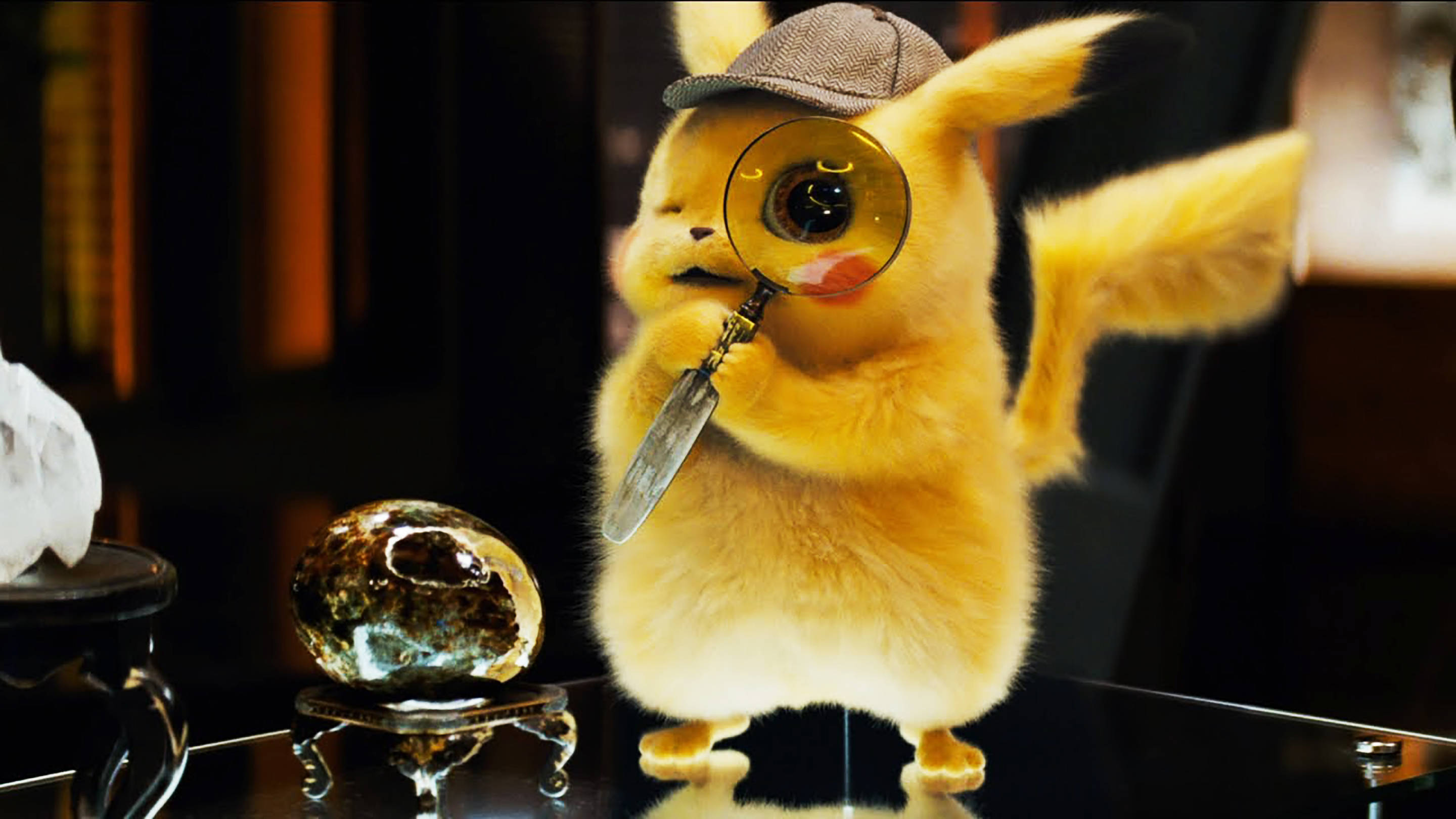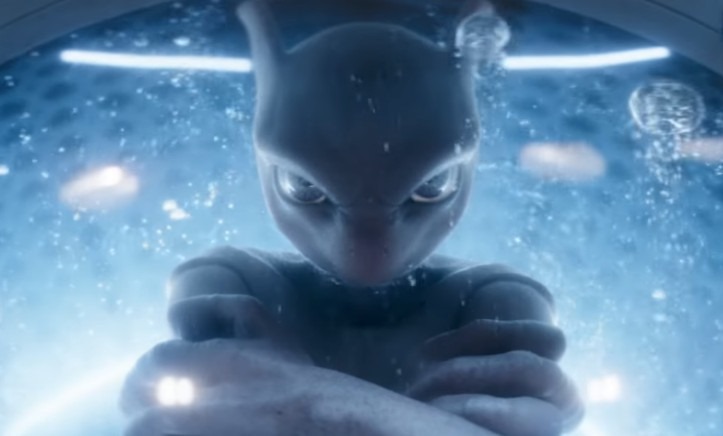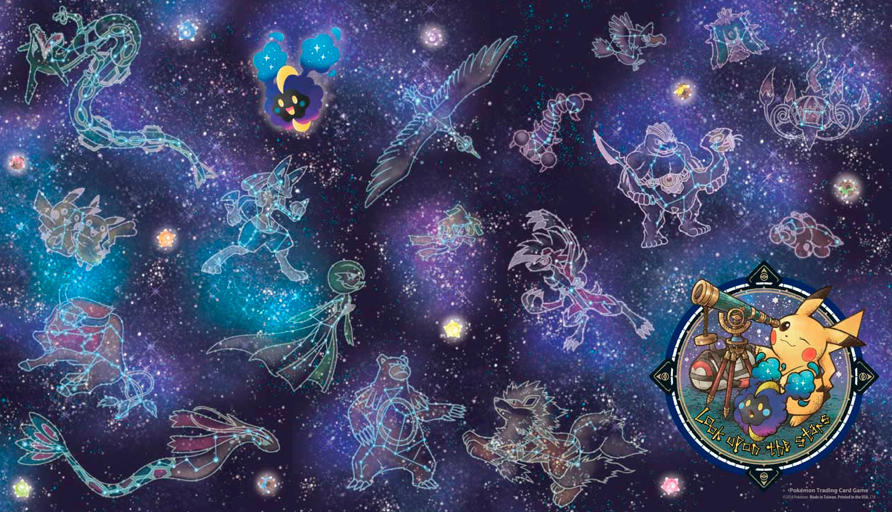On the Trail of Millennial Religion with Detective Pikachu
Ed
 Ed. Note: Warning: This column contains major spoilers for Pokémon: Detective Pikachu.
Ed. Note: Warning: This column contains major spoilers for Pokémon: Detective Pikachu.
The recent film, Pokémon: Detective Pikachu (2019), is the latest cinematic addition to the Pokémon series, the multimedia entertainment franchise that exploded globally in 1995—squarely in the middle of many millennials’ childhoods. Pokémon are sentient creatures who are incorporated into human society as laborers, athletes, and even as companions.
The first live-action Pokémon film, Detective Pikachu, while not featuring many of the franchise’s recurring characters, continues the series’ pattern of invoking supernatural forces—complete with religious imagery—to challenge antagonists who deploy capital and technology for nefarious ends. These religious interventions, however, only minimally alter the status quo. Looking to other religious practices that have recently (re-)entered the public eye, most especially the viral popularity of astrology, we can see that Pokémon’s invocation of supernatural power as an alternative to the constraining societal forces of corporate greed may help us discern a larger current of millennial religion.
Howard Clifford, Detective Pikachu’s antagonist, is an exorbitantly wealthy tech mogul suffering from an unspecified degenerative disease. He has been secretly funding illicit research on Pokémon—manipulating their physiology, rendering them feral, and even taking control of their minds.
 Crucial to Clifford’s agenda is Mewtwo, a genetically engineered super-Pokémon (whose genocidal attempts to purge humanity as payback for suffering at the hands of the scientists who created them are the central conflict of 1998’s Pokémon: The First Movie). Harnessing Mewtwo’s quasi-divine powers, Clifford hopes to have human souls violently possess Pokémon bodies and thereby overcome disease, with no apparent concern for the Pokémon effectively killed in this scenario. Clifford has even built a new city—Ryme City—that promises Pokémon full legal rights to lure them there for the speciesist seizing of their bodies.
Crucial to Clifford’s agenda is Mewtwo, a genetically engineered super-Pokémon (whose genocidal attempts to purge humanity as payback for suffering at the hands of the scientists who created them are the central conflict of 1998’s Pokémon: The First Movie). Harnessing Mewtwo’s quasi-divine powers, Clifford hopes to have human souls violently possess Pokémon bodies and thereby overcome disease, with no apparent concern for the Pokémon effectively killed in this scenario. Clifford has even built a new city—Ryme City—that promises Pokémon full legal rights to lure them there for the speciesist seizing of their bodies.
Enter the heroes: a young and jaded insurance claims adjuster, Tim Goodman, and a mysterious talking Pikachu, who has lost his memory but happens to be an adept detective. They are brought together by the disappearance of Tim’s estranged father, Harry (also a detective), following a serious car accident.
Tim and Pikachu’s investigation, alongside their budding friendship, reveals Harry had uncovered Clifford’s plot and that his car was in fact knocked off the road by Pokémon under the villain’s control. In a pivotal moment of retrospective exposition, the mystery-solving duo learn that Pikachu was in fact Harry’s Pokémon partner and was also in the car crash. Seeing that Harry would die from his fatal injuries, Pikachu had petitioned Mewtwo to move Harry’s soul into his own body to surreptitiously keep Harry alive until Clifford’s scheme could be thwarted. Mewtwo, levitating above them in a mandorla of light, grants Pikachu’s request and even issues a prophecy about the day on which Harry will be able to return to his human form and Pikachu will be restored to his normal self. Together, Tim, Pikachu, and Mewtwo are able to save the day, and there is a happy ending as Tim is reunited with Harry, with whom he’d unwittingly reconciled while inhabiting the body of Pikachu.
What is eerie though is that the human-Pokémon hybrid of Detective Pikachu seems simply to be the mirror image of Clifford’s violent goal of humans possessing Pokémon bodies. The fact that the former instance is wrapped in religious imagery—Mewtwo’s divine depiction, Pikachu’s laying down his life for that of his friend, and magical rituals linked to signs and omens—marks it as positive in contrast to the latter, where it is coded as a product of unethical scientific research, limitless corporate wealth, and violent oppression by Rhyme City’s elite.
It’s a fun story, but the details get muddy the closer you look. Did Tim really get to know his father over the course of the film or just a strange Pokémon-human hybrid? Is Mewtwo the sort of deus ex machina we want? Their (Mewtwo’s) pointed remark that “humanity is evil” suggests they have not changed that much from their murderous first cinematic appearance twenty years ago. In keeping with its many forebears, Detective Pikachu suggests the whims of legendary Pokémon are not all that different from those of the human antagonists.
This same ambiguity between the stress of societal pressures and the alleged consolation of cosmic power beyond our control is at the forefront of much commentary on that other religious obsession of millennials: astrology. Many voices have weighed in on the millennial astrology phenomenon.
 Some commentators have tried to see astrology as a personal, empowering spirituality in contrast to organized religion. On the other hand, The Atlantic last year called attention to the paradoxes of astrology. Millennials are both skeptical of religion and yet regularly read their horoscopes. Millennials do not just study astrology to know what to expect, but also frequently to account for past events beyond their control.
Some commentators have tried to see astrology as a personal, empowering spirituality in contrast to organized religion. On the other hand, The Atlantic last year called attention to the paradoxes of astrology. Millennials are both skeptical of religion and yet regularly read their horoscopes. Millennials do not just study astrology to know what to expect, but also frequently to account for past events beyond their control.
Taking religion seriously in Detective Pikachu gives us good grounds to agree: millennial religion is more complicated than a non-committal taking up of personally comfortable practices. Just as Tim and Pikachu are subject to the occult motives behind Mewtwo’s awesome power to thwart Clifford’s plot, so too does astrology not so much empower you so much as it helps explain your powerlessness. Amid the burnout and hopelessness endemic to US millennials as they proactively navigate their way in the current economic landscape, astrology provides the (small) comfort that in such a world you may not be responsible for all the failures you encounter.
Millennial religion itself, then, does not try to deny, much less remove, the crushing force of modern life. Rather, it can be seen in the words of absolution offered by Detective Pikachu, that millennial priest, to a distraught Tim: “It’s not your fault. It’s not anybody’s fault.”
Images: Pikachu (Photo courtesy of Pokémon: Detective Pikachu); Mewtwo (Photo courtesy of Pokémon: Detective Pikachu); "Look Upon the Stars" Pokémon marketing campaign.
 Author, Matthew Vanderpoel, is a PhD Candidate in the History of Christianity at the University of Chicago Divinity School and has been a visiting fellow at both the Collège de France and the École Normale Supérieure, Paris. Matthew’s dissertation analyzes the intersection of literary theory, philosophy of language, and theology at the University of Paris in the later Middle Ages. Author, Matthew Vanderpoel, is a PhD Candidate in the History of Christianity at the University of Chicago Divinity School and has been a visiting fellow at both the Collège de France and the École Normale Supérieure, Paris. Matthew’s dissertation analyzes the intersection of literary theory, philosophy of language, and theology at the University of Paris in the later Middle Ages. |
Sightings is edited by Joel Brown, a PhD student in Religions in America at the Divinity School. Sign up here to receive Sightings via email. You can also follow us on Facebook and Twitter.


